Preface
Table of Contents
When the B2B eCommerce world’s competitiveness is growing at a fast pace, wholesale online businesses’ success hinges on merchants’ comprehensive knowledge on B2B basis. To help Magento store owners stand a high chance of reaching the first position in this rejective race, we propose here needed information in Magento B2B Ecommerce to consolidate your B2B foundation.
Not acquainted with the B2B online world yet? ABSORB What is B2B eCommerce to get yourself a panoramic view.
In this article, we will walk you through the concept of Magento B2B Ecommerce in general & Magento B2B marketplace in particular, must-have B2B features for Magento sites & marketplaces, and some famous providers of B2B eCommerce solution any tech worm should grab in their hand.
Chapter I – Introduction to Magento B2B eCommerce
1.1. Understanding Magento B2B Ecommerce & B2B Marketplace
Definition of Magento B2B
Actually, there is no exact definition for the “Magento B2B” term. By and large, it’s about B2B businesses functioning on the Magento platform. Magento B2B revolves around activities and movements related to the formation, development, operation and flourish of B2B eCommerce stores built on Magento.

Unlike the B2C (Business to Consumer) model, Magento B2B (Business to Business) was born to meet the rising demands of sellers – Magento merchants – who primarily sell their products/ services to companies. Thus, their potential customers often run a company with complex organizational structures and various sub-users with different roles and access permission.
There are two basic players in Magento B2B Ecommerce:
- A seller is an admin user who accesses and monitors the system from the Magento Admin panel.
- A buyer is any corporate customer who accesses the system from the frontend.
The Operation Flow of B2B Business on Magento Platform
To dig deeper into Magento B2B Ecommerce, you should understand the workflow of a typical B2B eCommerce business built on Magento.
Company is the key component that entails the close involvement of all other B2B features. Specifically, each company – the buyer – has a corporate account that allows them to share the access permissions to multiple buyers. By assigning suitable roles to sub-users, they can conveniently build their own company structures in the appropriate hierarchy. This facilitates the admin to control user activity within an account such as quoting, purchasing, managing company credits, and many more.
Meanwhile, the seller can set up the actions of corporate customers at the website, including delivery and payment methods, pricing, negotiation process, requisition list creation.
When placing an order, the seller offers specific payment methods such as full payment and partial payment, so companies have an option to Pay on Account, as known as Credit purchase. Credits are allocated for a company account by the B2B seller.
In terms of pricing levels, with Magento B2B Ecommerce, the seller can configure custom prices per product for different companies/ customer groups.
As a nature of B2B transactions, the buyer and the seller often undergo the pricing negotiation to agree upon a satisfying price point prior to order placement. In other words, not jumping directly into the shopping cart like their B2C counterparts, B2B buyers can initiate dealing with the seller on prices and discounts. The person doing purchase jobs can create and submit quotes to the seller; then the seller will review those quotes before converting them into an order.
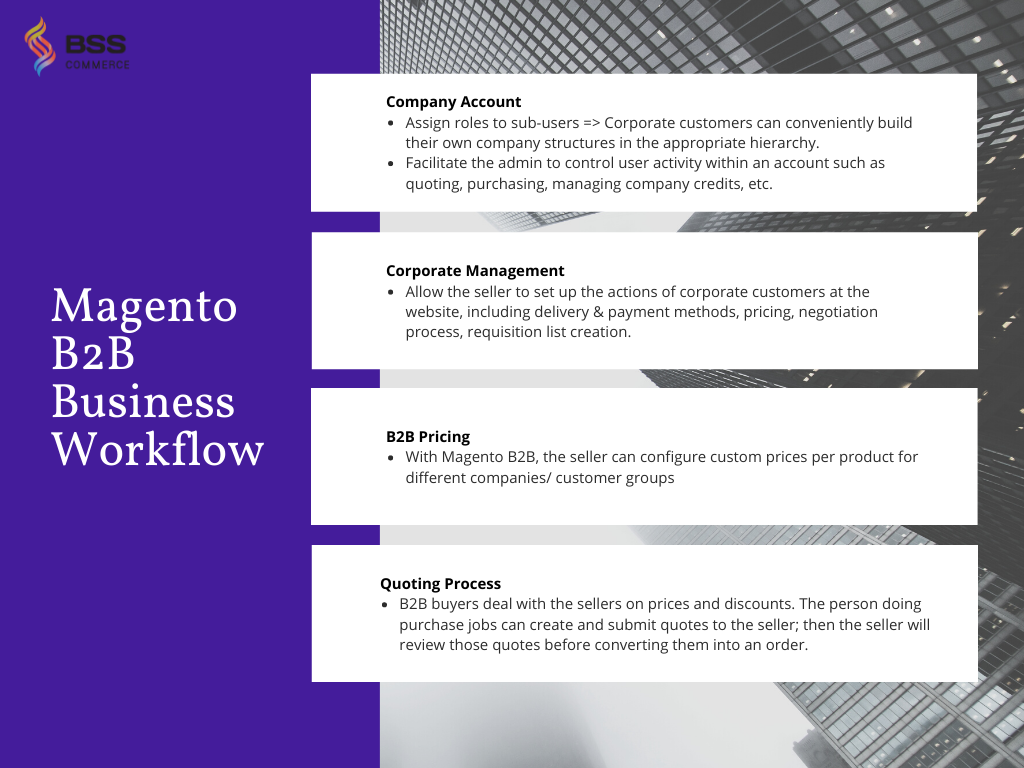
This buying process of Magento B2B Ecommerce users takes place as a loop in their business cycle.
Types of Magento B2B Website
Even when merchants choose Magento to shift from offline to online B2B business, they build it for different purposes though. Below are 4 main types of Magento 2 B2B websites in the community.

#1. One-vendor Magento B2B Website (A Sole Brand)
As its name implies, a single-vendor B2B website built on Magento platform is a dedicated store which only supplies the products/ services from one individual seller or one business. Most Magento B2B websites fall into this category.
For example, Nike – a famous sportswear brand – offers a dedicated website selling only Nike products. Bulk Powders, Mr. Price Group, Oliver Bonas, Lladró are some of the famous B2B eCommerce websites functioning on the Magento platform.
#2. Multi-vendor Magento B2B Website (A Number of B2B Providers)
The second type of Magento 2 B2B website gathers items from their own companies and different providers/ manufacturers under one roof. Usually, multi-vendor site owners will take full control of the product descriptions, images, and vendors on site. Besides, Magento site owners are fully in charge of stock status and shipping.
Some typical examples of this website type are Asos, Macy’s, and Amazon. Among them, don’t confuse Amazon with Amazon Marketplace.
#3. Magento B2B Marketplace
A Magento B2B marketplace brings together many buyers and sellers in the same place. The marketplace operator monitors the entire shopping community on their site and impose some restrictions on what is legal to be sold. They will intervene when there’s a disagreement between sellers and buyers; nevertheless, vendors on marketplaces get much more reign compared to those on multi-vendor B2B websites.
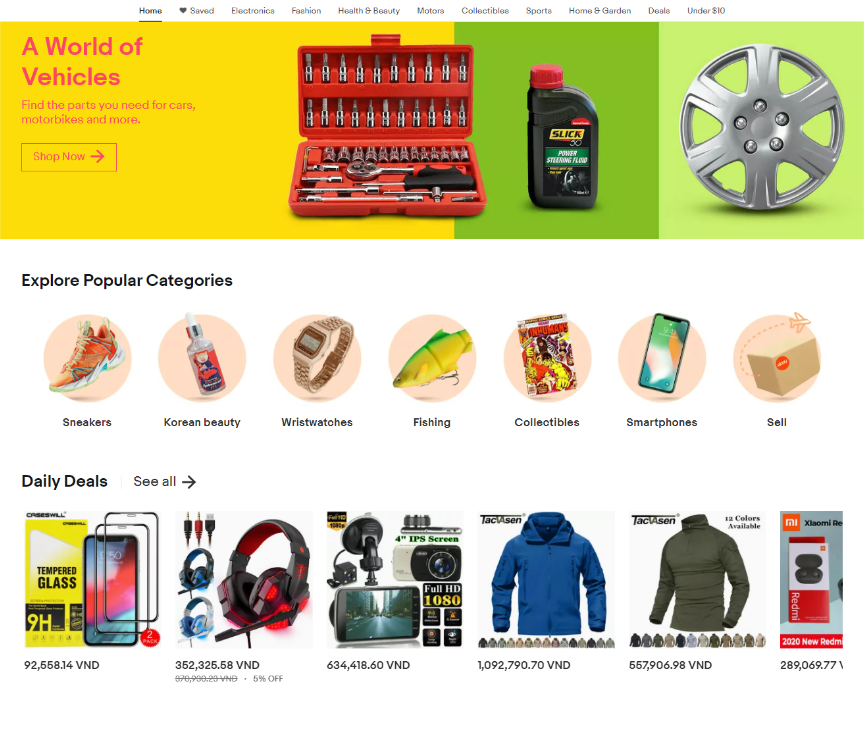
Amazingly, only 6% of B2B customers don’t currently utilize online marketplaces, while 75% of B2B procurement spending tends to take place via an online marketplace within the next five years.
According to Gartner, the B2B marketplace has become an open ecosystem that offers merchants new capabilities and raises the chance to generate new sources of revenue. In other words, marketplaces are more time and cost-effective, compared to traditional websites, because they serve as a one-stop-shop for B2B vendors and buyers.
Since we noticed an upward trend in converting from a normal Magento 2 store to a Magento B2B marketplace, we will divide our article into 2 major flows of information concentrating on normal Magento 2 B2B websites and marketplaces.
1.2. Benefits of Shifting Your B2B Business to Magento
Due to a jungle of platforms available on the market, you may be bewildered about which option is the best for your B2B business. As you may know, Magento has always been put in the first line of the most suitable wholesale platforms because it supports tons of features serving B2B customers’ needs closely.
To give you a clearer overview, we bring here some visible advantages of building your B2B site on Magento.
#1. Support B2B Features in Commerce Edition
We all know that Magento has 3 main editions including Open Source, Commerce, and Commerce Cloud. Among them, Open Source is the most popular thanks to its cost-efficiency and scalability. Besides, many large wholesale businesses still opt to build their site on Magento Commerce because it supports B2B features. This paid edition is a ready-made B2B eCommerce solution that roots for friction-free purchasing, personalization, and agility to adapt.
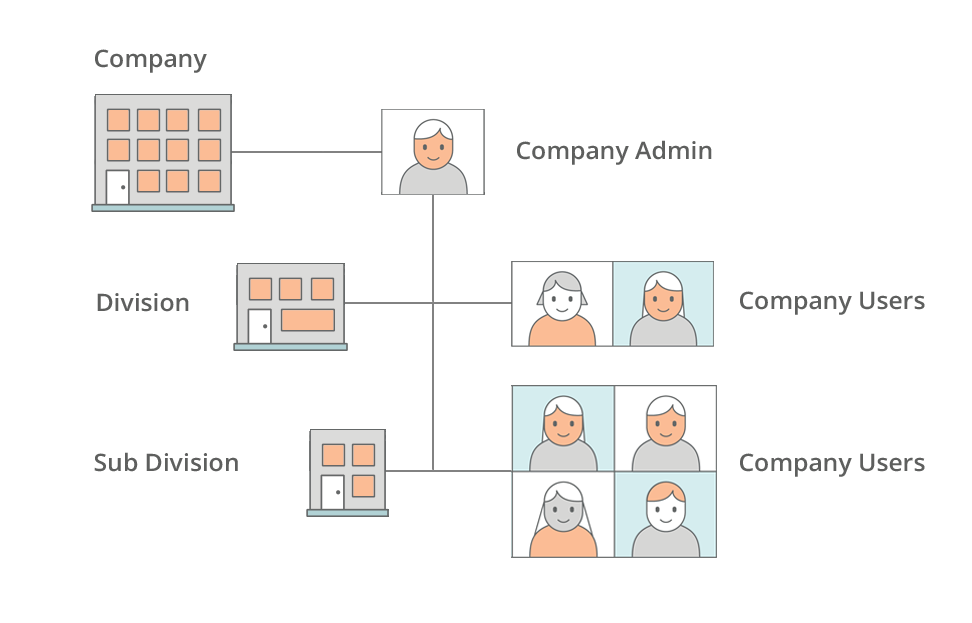
#2. Allow B2B Customers to Experience like their B2C Counterparts
Coming first at the top reasons, Magento’s expertise in B2C is the most appealing benefit that persuades merchants to use Magento as a B2B site. Naturally, B2C customers have a more enjoyable shopping journey because of small-to-medium order volumes, fast decision time, and simpler data management. Yet, corporate customers are raising the demand for an easy purchase process like that.

According to a Forrester study, 48% of surveyed B2B sellers said their website performed worse than B2C ones in terms of user experience. Spotting that problem, Magento marketplace offers a wide range of online B2B solution choices so you can equip your store with enough features that simplify the ordering procedure on the storefront and thereby ensure a B2C-like experience.
#3. Implement PWA Studio to Break the Boundaries
Realizing that more and more customers are using mobile devices to shop online, even B2B buyers, Magento has launched the PWA Studio as a devoted solution to multi-device users. Once merchants convert their storefront into a PWA by applying Magento 2 PWA themes or PWA extensions, the UX would be enhanced dramatically.

#4. Integrate Electronic Data Interchange (EDI)
Not only focusing on the shopping experience on the frontend, but Magento also ensures to streamline the backend management. While an engaging neatly-designed frontend can show off the business value, EDI integrations help empower Magento website capabilities.

Gradually, for the needs of transparent online conversations and simple management, EDI has become a crucial element of B2B eCommerce companies. Lots of B2B “giants” like Home Depot have claimed to use EDI as a communication method with their corporate customers.
Magento solution providers will handle ERP and extension integrations (via Magento’s API), and a technology partner can meet EDI needs. With end-to-end integrations with trading partners, store owners can transform Magento into a command center by bringing in purchase orders and sending out invoices, at the same time syncing the inventory with B2B customers.
With Magento, information exchange and data migration have never been so easy.
Chapter II – Essential B2B Features for a Magento Website & Marketplace
2.1. Crucial Features for a Magento 2 B2B Website
#1. Personalized Products/ Categories for Specific Customer Groups
Because potential customers of B2B businesses pay much attention to preferential prices and tailored catalogs, a fundamental B2B eCommerce store should be able to restrict access to certain categories per specific customer groups. This special treat allows store owners to lead shoppers to the relevant place, and hide valuable content from competitors’ eyes at the same time.

Since corporate customers are doing their purchasing job, landing the right place helps minimize their research time and motivate them to take desired actions.
For example, you can restrict some products/ categories/ private information from guests, then force them to login to define who they are and which content should be shown to them. This way, the confusion of B2C customers when reaching categories customized for B2B audiences will disappear.
#2. Corporate Database Management
Frankly, whether you are running a B2B or B2C business, it’s essential to optimize the management of both you and your business customers, so that you two feel comfortable on any touchpoints.
For B2B sellers:
- Ability to create a unique registration form for corporate customers: Default Magento doesn’t offer separate sign-up forms, which will be extremely confused if your site sells to a wide variety of customers. Therefore, a good enough website should allow you to create a unique registration form for each audience with informative fields to gather as many customer details as possible.
- In-charge sales representative assignment: Business customers are not as simple as individual ones. They don’t just buy once and then disappear, instead, they tend to come back to place orders seasonally and repeatedly. As a result, you need a sales rep team to maintain that long-term relationship professionally, which entails a feature to assign sales reps to specific customers.
For B2B buyers:
- Also, B2B buyers manage a group of people who make purchases with you and sell to other customers. That nature gave rise to a desire for a company account that enables sub-users to share the same account. This helps corporate customers manage departments in charge of purchasing jobs more easily and efficiently.
#3. B2B Pricing Diversification
Every B2B merchant is scouring for the know-how to come up with smart and reasonable B2B pricing strategies for various customer groups in their business cycle. A fundamental Magento 2 B2B website should cover powerful tools to reinforce your business price diversification. The idea here is: hiding prices of specific products and customizing prices of others to support a straightforward B2B negotiation procedure. This way, you two can deal the best final price for both sides and reach up to the mutual agreement faster.

The request for quote capability enhances the seller-buyer interaction and maximizes the success rate of closing deals. Along with that, this two-way communication acts as an incentive for merchants to expand brand awareness and also helps you avail higher conversion rates.

#4. Faster Purchase Procedure
The slower the checkout is, the higher the abandonment rate will be. Due to a limit on the amount of shopping time, B2B customers easily lose their temper with the lengthy and tiresome order placement process. So, when searching for a Magento 2 B2B solution for your online business, make sure that option gives you the ability to simplify the order placement:
- Search and place orders all in one single quick form;
- Offer requisition lists for B2B customers to organize their future purchases better;
- Tailor different shipping and payment methods to different customer groups;
- Save order history under one place to encourage repeated orders.
#5. Enhanced B2B Customer Retention
It’s not easy to persuade B2B customers to place bulk orders on your site, keeping them with you is a thousand times harder. One of the reasons why they decided to maintain a stable business relationship with your Magento 2 B2B store is whether or not your refund policy is swift and definitive.

Thus, another indispensable feature for a Magento wholesale website is honing your money-back guarantee to soothe the frustration of buyers. Grant customers with virtual points/ credits to motivate them to make another purchase with you.
#6. B2B Mobile eCommerce Optimization
Mobile web traffic doubles every five years, and Magento B2B businesses can’t escape the game. The use of mobile devices of B2B customers tends to increase rapidly since Gen Y moves into managerial positions.
Actual statistics also speak louder the need for a streamlined multi-device experience of B2B buyers:
- “50% of B2B queries today are made on smartphones.”
- “Mobile drives, or influences, an average of over 40% of revenue in leading B2B organizations.”
PWA
Progressive Web Apps (PWAs) are a great assistant helping your business embrace mobile eCommerce. PWAs offer additional features based on devices, provide offline capabilities, push notifications, native-app-like appearance, and store resources locally.
Magento B2B stores integrated with PWA technology are more accessible and convenient on all devices, thus able to drive sales. Thanks to its benefits, merchants are racing to catch up with this feature.
#7. Friction-free Integration
As a guarantee for effective business management, integrating your Magento B2B eCommerce website with enterprise systems is a must. The connection with ERP, CRM, PIM keeps the backend updated with real-time data by conveniently synchronizing critical data such as tier prices, quotes, product line, orders, stocks, invoices, customers, shipping, and so on.

In brief, by combining extensive APIs, blue-ribbon extensions, and third-party integration, you can automatically exchange databases, monitor activities, take everything under control, and drive more sales.
2.2. Must-have Functionalities for a Magento 2 B2B Marketplace
Even a Magento B2B marketplace also needs the features mentioned above. More than that, you should embrace other degrees of competence to ensure your marketplace to perform at its best.
#1. Filtering & Search Bar Optimization
Advanced filtering and searching bar is the key to streamlining B2B buying journeys. Giants like Amazon Marketplace concentrate on improving this feature to convert consumers to customers quickly and pique their notice in other items that appear as recommendations when they enter a keyword.

Moreover, the application of layered navigation and filterable attributes assists B2B buyers in seeking exactly what they want in the blink of an eye. For example, customers can filter their search by price range, brands, availability as well as custom attributes created by vendors.
#2. Appealing Product Presentation
ROPO (or ROBO), which means research online – purchase offline, is a huge challenge in the environment of Magento B2B marketplace. This phenomenon is due to the fact that online B2B buyers’ decision-making process is restricted because they cannot physically touch and inspect a product.
A point to alleviate this hindrance is to present high-quality product images and videos on the vendors’ stores, which enable shoppers to zoom in – zoom out for a better feel of the item.
#3. Vendor & Multi-Warehouse Management Capabilities
For those building a marketplace, you should include features that facilitate vendors on your B2B marketplace to manage their own company details, contacts, product pages, catalogs, and product prices.
Another useful feature for B2B buyers is the ability to split their orders to various suppliers, brands, and warehouses based on stock availability and negotiations.
#4. Vendor Management for the Admin
In some aspects, vendor engagement contributes significantly to the growth of your Magento B2B marketplace. You – the marketplace operator – may crave for identifying the performance of each vendor to make suitable adjustments and draw other vendors’ attention.
Prepare yourself a well-integrated CRM system to facilitate your management and analysis of vendor data. By the way, as we have mentioned above, you should give vendors access to their own dashboard so they can keep a record of orders and develop business relationships under one roof.
#5. Flexibility to Edit Purchase Orders
Due to the versatility of B2B marketplaces, buyers on these expect a feature to edit their purchase orders. They may want to adjust delivery and payment methods, shipping address, and many more.
#6. Vendor Comparison and Product Bidding Support
Among a plethora of vendors on your Magento B2B marketplace, wholesale buyers usually have difficulty in choosing the best-fit vendors with the best deal on their every need. To clear this nervosity, your solution should make it easier for customers to compare pricing from different suppliers for a sound judgement.

Moreover, if you want to optimize user experience, it’s wise to include a product bidding feature that lets sellers create the auction on their products.
Chapter III – Magento 2 B2B Website & Marketplace Development Basis
The last section of this resource would give you a bunch of crucial elements (or components) that form a standard Magento B2B online trading place. From that, you can depict a panorama of building a Magento B2B normal website and a Magento B2B marketplace. Let’s see what you should take into consideration!
Wanna build a new Magento B2B website but don’t know how? Explore this B2B Implementation service to help you from a to Z.
3.1. Basic Elements of Magento 2 B2B Site Development
#1. Developers or Agencies
You need to define the complexity of your requirements to choose whether hiring a freelance developer, or a web development agency or forming an in-house development team. This is a vital factor determining the success of a Magento B2B website because developers are the ones who directly work and ensure the website quality.

#2. Magento 2 B2B Hosting & Domain
Buying a domain and server hosting gives you more opportunities to boost your online business. The ability to reach potential customers will be higher than those using free domain and hosting.
Check this round-up list to choose the best hosting provider for your site:
#3. Magento Installation
After the domain and hosting have been connected, you will proceed to install the Magento platform and start to edit elements on the website.
#4. Magento 2 B2B Theme
Themes, in general, will be divided into 2 categories:
- Free themes have simple interfaces, few features, suitable for making your own blog, sharing knowledge, blogging, etc.
- Paid themes contain full features to suit your needs.
Once you have picked a suitable theme, you can customize it so your website becomes more eye-catching.
Pick a seducing theme for your Magento B2B website here:
#5. Magento 2 B2B Extension
This is an indispensable element for any Magento Open Source user. Default Magento lacks features to serve all demands of B2B sellers and buyers, so Magento 2 B2B extensions are born as a matter of course. They play as additional gadgets to make your store more B2B-like, accelerate order placement, provide seamless pricing negotiation, and enhance a sustainable partnership.
Some must-have features that solution providers offer include category restriction, B2B registration form, request for quotes, company account, sales rep, requisition lists, and so on.
Perplexed by a myriad of options in the market? We recommend here a few well-known suppliers so that you can find reputable sources that help improve the quality of your website.
Provider 1 – Magento 2 B2B Solution by BSS Commerce
As an industry-leading provider of ultimate solutions for Magento B2B, BSS Commerce has soon launched a Package containing B2B-centered features and gained a firm customer base.
The B2B functionality will ease corporate data management, hone B2B pricing, fasten order process, minimize checkout confusion, and enhance customer retention.
This solution always stands at the top recommendation lists because it encompasses every stage of B2B customer purchasing flow.
READ DETAILS on Magento B2B Extension to know how BSS Package can support every step of B2B buying journey.
Provider 2 – B2B Suite for Magento 2 by Amasty
For any Magento store owners and developers, Amasty may not be a strange brand. With over 10-year experience in developing and providing Magento products, they offer high-quality extensions to solve Magento site problems. Despite the late appearance of Amasty Magento 2 B2B Suite, it has quickly grown and snatched the competitive edge.
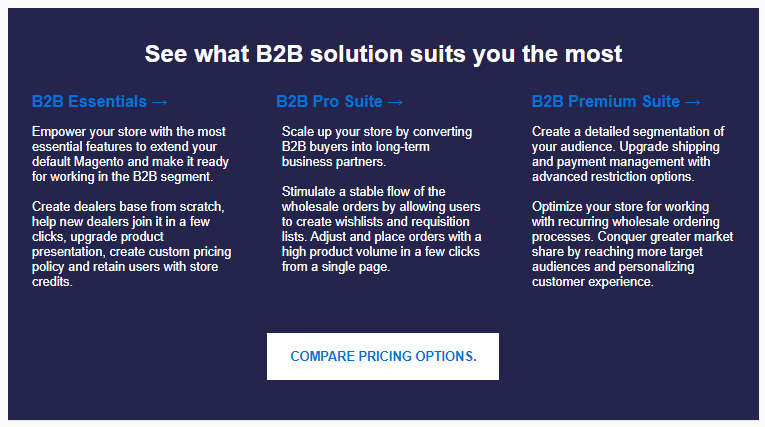
Not chasing after quantity, their B2B suite includes a limited number of vital features for B2B business survival. Specifically, the solution focuses on a wholesale company’s activities such as dealing, access restriction, customized pricing, company account, and more.
Provider 3 – Magento 2 B2B Extension by MagePlaza
MagePlaze is a reliable brand with good-quality Magento 2 B2B extensions and dedicated support service.
Inspecting their product, you would be impressed by a wide range of features covered in their Magento 2 B2B Solution. They appear to be striving for filling product gaps that their competitors haven’t yet filled in. The solution is famous for including the highest number of extensions.
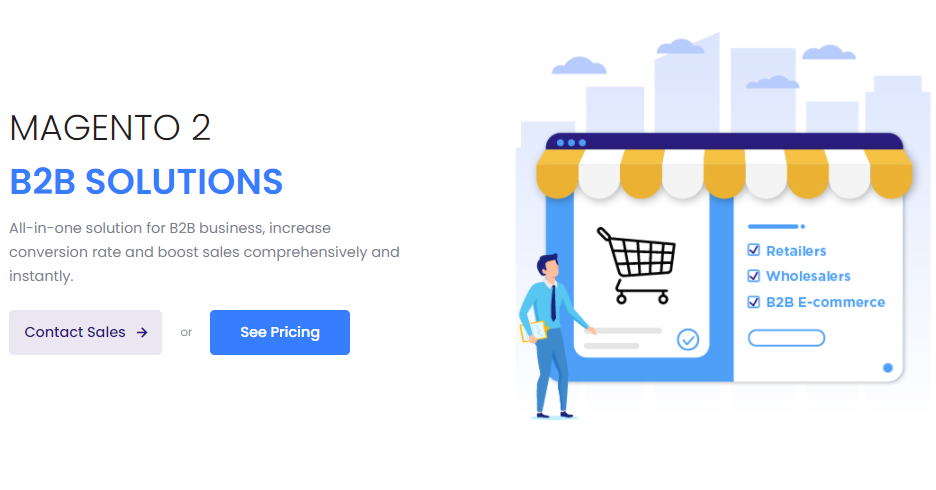
Some unique features that only MagePlaza gathers in this suite are Milestone, Share Cart, GTM / GA, Product Feed, and so on.
For more details on these providers, don’t hesitate to read our Magento 2 B2B Solution Comparison.
#6. Security Improvement
Security should be put at the highest priority of any B2B companies due to its effects on different related people. During Magento B2B website development, there are still many jeopardies concerning data storage and transfer.
The negligence of Magento B2B security can result in the loss of confidential details about your partners, their private files, valuable content, bank account, order information, etc.
Data loss can be caused by hackers or malware infections, which urge online businesses to seek a solution for enterprise system security.
#7. Website Layout
A website design with a clear, detailed layout and specific categories will help each customer quickly know where the product/ service they are looking for is. You should arrange the category layout bylines and product types to not only bring convenience to visitors but also enhance professionalism.
#8. B2B Website Maintenance
Many merchants think that the Magento 2 B2B website development process would end as soon as their online store was launched to the market. However, a professional site will have to undergo additional maintenance. No matter how carefully your website is designed, tested and edited, there are always errors.

Not only that, during the operation, you will surely receive a jungle of customer feedback which may cause some delay to the site performance. So, remember to plan and schedule a specific time for the website upgrade. It could be 3 months, 6 months or even more. Regular maintenance set the seal on higher B2B customer satisfaction.
Not everyone has enough time and money to spend on developing a site from start to finish without predicting its effect on their business. At this point, merchants began expecting a solution that would help them minimize the time and efforts spent on their development, yet allow them to track site performance and make timely adjustments.
For that reason, we have officially launched the ready-made Magento B2B website as a lean product delivered in a short time. This product includes a minimal site with full B2B functionality built on the Magento platform. Incredibly, the product’s delivery time was within 12 hours since we received your order placement.
Just by selecting a suitable industry and one click of the checkout page, we will prepare and put in your hands a comprehensive standard Magento B2B site in just 12 hours of waiting.
3.2. Added Elements for Magento B2B Marketplace Building
Once you’ve built a standard Magento 2 B2B website, switching to a marketplace shouldn’t be too difficult. Basically, the initial construction steps of a Magento b2B marketplace are similar to those above when you develop a normal website. Furthermore, you’ll need more features for vendor-buyer interaction, a convenient search bar, and a precise rating & review section.
Magento 2 B2B Marketplace Extension
After you make sure to include all crucial B2B and marketplace functionalities in your website, let’s install a Magento 2 B2B marketplace extension to your store. It will help you create an online place where corporate customers and suppliers around the world can reunite and do transactions with each other. Make sure to choose a module that covers B2B-driven features.
You can refer to the following example of trustworthy marketplace solution providers.
Magento 2 Multi-vendor Marketplace Extension by Webkul
For those building a B2B marketplace, Magento 2 multi-vendor marketplace extension by Webkul will help convert your Magento B2B normal site into a complete online marketplace store.
To be more specific, B2B sellers can manage the inventory, shipment, profile page, collection page, and much more. Besides, they can add multiple product types like Simple, Configurable, Virtual, and Downloadable products.
Moreover, the Webkul marketplace module supports all Magento 2 templates and themes and is compatible with responsive web designs.
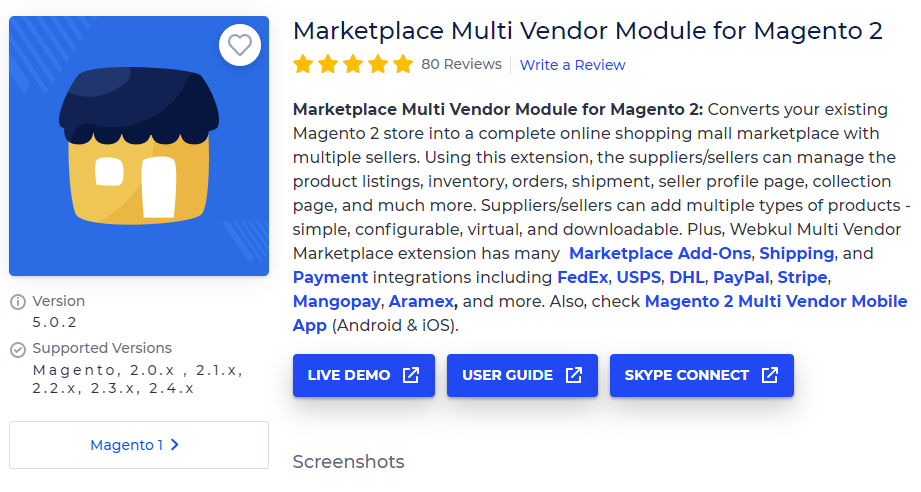
Check this post for more options of Magento 2 B2B Marketplace modules:
Extra Function for Vendor Management
The above development elements for Magento B2B websites only support the work of B2B store owners and buyers, meanwhile, vendors – the actor selling on your marketplace – stood on the edge of oblivion. In fact, the original website doesn’t consist of functionality for vendors to take some actions such as managing and editing their own micro-stores, products, orders, quotes, and more.
To literally call your store a Magento B2B marketplace, your development team needs to do some customization jobs and install needed extensions to arm your store with full features for vendor management.
Conclusion
In a nutshell, the article has shared about Magento 2 B2B knowledge base emphasizing two main subjects – Magento B2B websites and Marketplaces – so any innovators and early adopters can take advantage of them to pick the most suitable solution for their B2B eCommerce business.
Hopefully, you’ve perceived the concept of Magento B2B in general and marketplace in particular, grasped all must-have features for the two in the palm of your hand, comprehended critical elements for the development of a normal B2B website and a marketplace, as well as choose the best Magento 2 B2B solution provider for your business. They’re all that we expected readers to draw from this material.
In case you want to build a B2B fashion webshop, don’t hesitate to talk with us. We listen to your story and resolve every requirement as soon as possible.
BSS Commerce is one of the leading Magento B2B extension providers and B2B web development services in the world. With experienced and certified Magento developers, we commit to bring high-quality products and services to optimize our business effectively. Leave us information in the following form. We are willing to support you every time for the best wholesale website.
